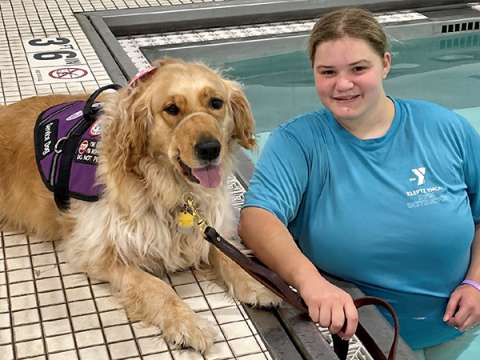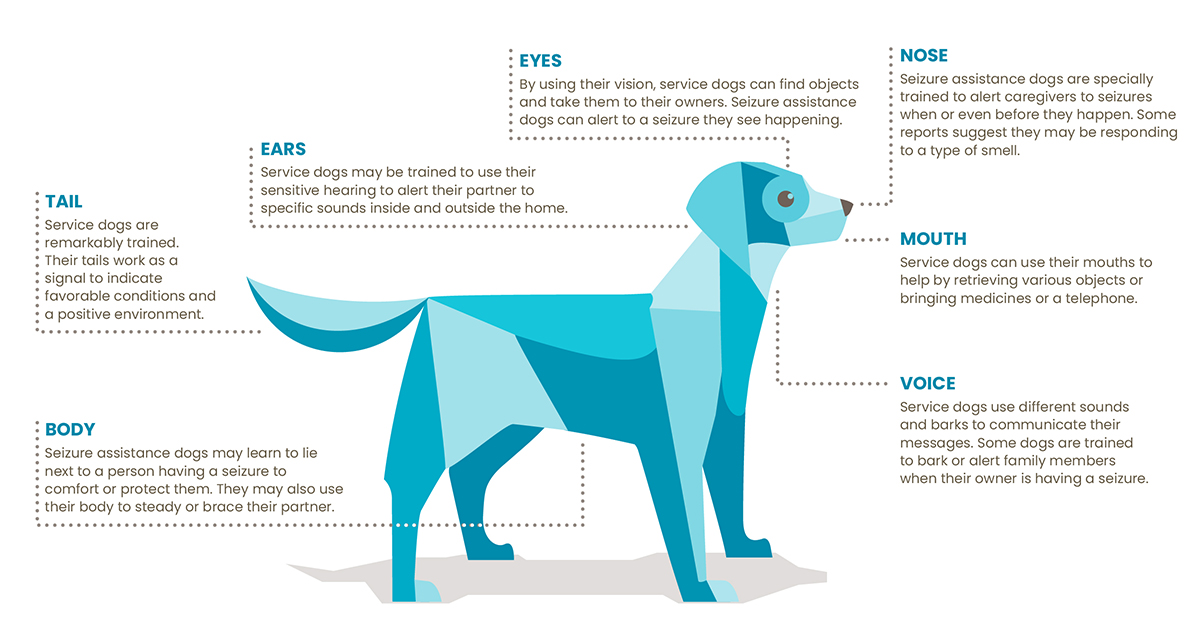For more than 12,000 years, there has been a special bond between dogs and humans. Canines are known for being loving, faithful companions, but some fearless pups are trained to serve an even bigger purpose – working as service dogs to support people living with certain medical conditions, like epilepsy.
Types of Support Animals
There are three types of recognized support animals:
- Service dogs
- Therapy dogs
- Emotional support animals (ESAs)
According to the Americans with Disabilities Act (ADA), a service dog is individually trained to do work or perform tasks for people with disabilities, but dogs can also be trained to perform broader tasks. Therapy dogs are trained to provide comfort, affection, and support in various settings such as hospitals, nursing homes, or schools. ESAs provide comfort and support to people with mental health conditions or emotional disorders, and do not require specific training. Service dogs are legally protected under the ADA and are granted access to almost all public spaces with their handler, while therapy dogs and ESAs have more restrictions.
Various qualifications are required to obtain and own a service dog. For more information on how to qualify or to learn more about service dogs, search our Epilepsy & Seizures 24/7 Helpline Resources for seizure assistance dog organizations near you.
Abilities of Seizure Assistance Dogs
For people living with epilepsy or other seizure disorders, service dogs, often referred to as seizure assistance dogs, can be trained to provide care and comfort to their owners. Yuki, a Golden Retriever, is a seizure assistance dog trained at 4 Paws for Ability, a non-profit organization that breeds, raises, trains, and places service dogs with children and veterans who have disabilities. In 2019, Yuki was paired with Hannah, who is living with Dravet Syndrome, a rare form of epilepsy. Yuki is specifically trained in seizure alerting, mobility, behavior disruption and retrieval but most importantly, providing support to Hannah. Having Yuki allows Hannah to experience more freedom and provides her family with extra peace of mind.
Image

“As Hannah explores employment opportunities, Yuki will be with her to ensure she can maintain a level of independence that would not be possible without the help of a service dog.” – Marcia K., Mother of Hannah
Seizure assistance dogs undergo rigorous long-term training to learn how to respond to a seizure and help their owner navigate day-to-day life. These special canines are trained to bark or alert a person’s family when they are having a seizure. Others may learn to lie next to the person while having a seizure, and some seizure assistance dogs are even specially trained to recognize an oncoming seizure before it occurs. These dogs can provide a sense of security and comfort and reduce anxiety during and after a seizure.

Seizure assistance dogs can also play an important role for families of children with epilepsy – both outside the home, like in Hannah’s case, and inside the home. When Blake was 3 years old, he had his first seizure and was eventually diagnosed with epilepsy. Blake’s seizures often occur at night, leaving his family fearful that he may have a seizure while they are asleep. Barnett, a dog trained at 4 Paws for Ability, was partnered with Blake and is trained to alert his parents to seizures and provide extra comfort for Blake.
Our Involvement
The Epilepsy Foundation and 4 Paws for Ability are proud partners of Magnolia Paws for Compassion, a special program created by Eisai Inc. which seeks to increase awareness of animal assistance and raise awareness of the many benefits that service and therapy dogs can provide to those coping with an illness, such as epilepsy or a seizure disorder. To date, the program helped place 24 service dogs, including Yuki and Barnett, to families of children with seizure disorders.
Learn more about:
3/24 US4222
This post was originally published on this site be sure to check out more of their content.







































